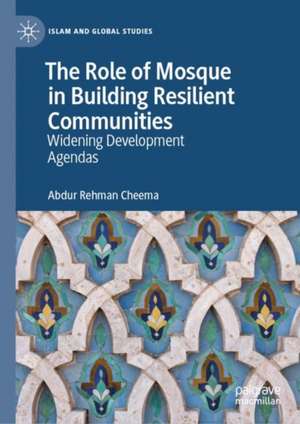The Role of Mosque in Building Resilient Communities: Widening Development Agendas: Islam and Global Studies
Autor Abdur Rehman Cheemaen Limba Engleză Hardback – 5 dec 2021
Preț: 727.97 lei
Preț vechi: 887.76 lei
-18% Nou
Puncte Express: 1092
Preț estimativ în valută:
139.33€ • 143.59$ • 117.63£
139.33€ • 143.59$ • 117.63£
Carte tipărită la comandă
Livrare economică 01-15 martie
Preluare comenzi: 021 569.72.76
Specificații
ISBN-13: 9789811675997
ISBN-10: 9811675996
Pagini: 173
Ilustrații: XXV, 199 p. 7 illus., 3 illus. in color.
Dimensiuni: 148 x 210 mm
Greutate: 0.45 kg
Ediția:1st ed. 2022
Editura: Springer Nature Singapore
Colecția Palgrave Macmillan
Seria Islam and Global Studies
Locul publicării:Singapore, Singapore
ISBN-10: 9811675996
Pagini: 173
Ilustrații: XXV, 199 p. 7 illus., 3 illus. in color.
Dimensiuni: 148 x 210 mm
Greutate: 0.45 kg
Ediția:1st ed. 2022
Editura: Springer Nature Singapore
Colecția Palgrave Macmillan
Seria Islam and Global Studies
Locul publicării:Singapore, Singapore
Cuprins
Chapter 1: Disasters, Development and Resilience.- Chapter 2: Disasters and Religious Institutions.- Chapter 3: Disaster Management in Pakistan.- Chapter 4: The Role of the Mosque in the Aftermath of the Earthquake and Its Future Potential.- Chapter 5: Opportunities and Challenges of Engagement with the Mosque as a Community-based Religious Institution.
Notă biografică
Abdur Rehman Cheema is an economist and development professional with PhD in Development Studies (Massey University, 2012). He has served in academia, non-profit, national and international organizations. He has held Charles Wallace Fellowship and University of Oxford fellowship. Currently, he is working for the UNDP at the Federal Sustainable Development Goals Support Unit, Ministry of Planning, Development, Reform and Special Initiatives, Pakistan Secretariat, Islamabad.
Textul de pe ultima copertă
Though the importance of religious networks in disaster preparedness and relief is increasingly recognized, there are few rigorous studies based on fieldwork in Muslim majority countries. Abdur Rehman Cheema combines deep experience of practical humanitarian action with scholarly reflection. He discusses both the actual and the potential contribution of mosques and imams to disaster management in Pakistan, judiciously balancing the restraints imposed by fatalistic interpretations of Islam against its power to inspire altruism and commitment.
Jonathan Benthall, University College London, UK
This book is about the role of the mosque in the aftermath of the 2005 earthquake in Pakistan. Disasters give rise to a situation where people from different parts of the world, quite unfamiliar with each other, come into contact to save lives, provide necessities such as food and shelter, rebuild homes and enable community recovery. During these challenging times, community-based religious institutions such as churches, mosques and temples are a practical choice for reaching people living nearby to fulfil their needs. The book shows the contributions of the mosque as a physical, spiritual and social place for improving the knowledge and practice of disaster risk reduction and management including the COVID-19 pandemic. It also illuminates the widening role of religion in development. The book reinforces the case for broader engagement with all community-based religious institutions. The book is of interest to academics in diverse fields including development studies, disaster studies, sociology, anthropology, religion, Asian studies, emergency and disaster management. It will also of interest to the professional staff of disaster management authorities, public sector, bilateral and multilateral aid allocation and implementing agencies and those of humanitarian organizations.
Abdur Rehman Cheema is an economistand development professional with PhD in Development Studies (Massey University, 2012). He has served in academia, non-profit, national and international organizations. He has held Charles Wallace Fellowship and University of Oxford fellowship. Currently, he is working for the UNDP at the Federal Sustainable Development Goals Support Unit, Ministry of Planning, Development, Reform and Special Initiatives, Pakistan Secretariat, Islamabad.Jonathan Benthall, University College London, UK
Caracteristici
Discusses the roles that mosques play in saving lives and reducing losses Shows the role of imams' flexibility to help communities in need Presents point of view to see religion differently in a much broader constructive array than portrayed since 9/11



